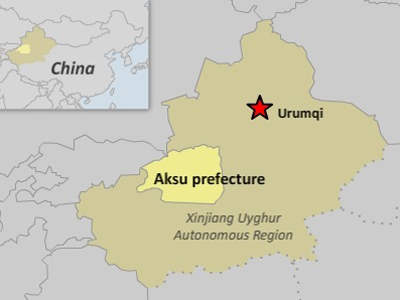Eight farmers and an imam serving as a worship leader from a village in Aksu are serving prison sentences from seven to nine years for practicing their religion during China's "strike hard" campaign to crack down on Turkic ethnic Uyghurs in the country's agitated northwestern Xinjiang region, according to local residents and officials. Their "crime" reportedly was that they prayed together outside of the government-designated mosque.

The map shows Aksu prefecture in northwestern China's Xinjiang region.
The imam, who was arrested in May 2015, received a nine-year sentence last September for teaching religion illegally in the prefecture's Peyshenbebazar village, while the farmers each received a seven-year sentence for praying together in places that authorities had not designated for Muslim worship, according to information recently obtained by RFA's Uyghur Service.
The trials during which the farmers were sentenced were not open to public, although some family members were allowed to attend.
The age of the accused farmers ranged from 17 to 62, all of whom authorities arrested in September of 2014 and sentenced last February, said Mamut Awut, security chairman of Peyshenbebazar village, as reported by Radio Free Asia.
A letter from a village resident sent recently to RFA said the imam and the farmers had now joined the ranks of political prisoners who number one per every three families in Peyshenbebazar, an unusually high figure for a village in which about 300 families comprise a population of 1,500 people.
"Eight farmers were sentenced for seven years for praying together," Awut said. "We warned them not to say Friday prayers separately, not following the designated imam, but they had prayed on Fridays together in different places four times in six months."
The farmers also had organized religious gatherings at other people's homes, he said.
After a deadly suicide bombing in May 2014 in Xinjiang's regional capital Urumqi, Chinese authorities, who blamed the attack on Uyghur separatists, rolled out the strike hard campaign to crack down on members of the Turkic-speaking, Muslim minority group, reports Radio Free Asia. The campaign included police raids on Uyghur households, restrictions on Islamic practices and curbs on the culture and language of the Uyghur people, including videos and other material.
It was during this time that authorities in Aykol township deemed the Peyshenbebazar village farmers' private prayer sessions at places they had not officially designated for worship as a sign of religious extremism, Awut said.
As a result, the men were arrested and indicted on religion extremism charges, he said.
"They were all obedient people, ... but because they prayed separately instead of following the government-designated imam, they were wrong," Awut said. "It was a clear expression of dissatisfaction with the government."














